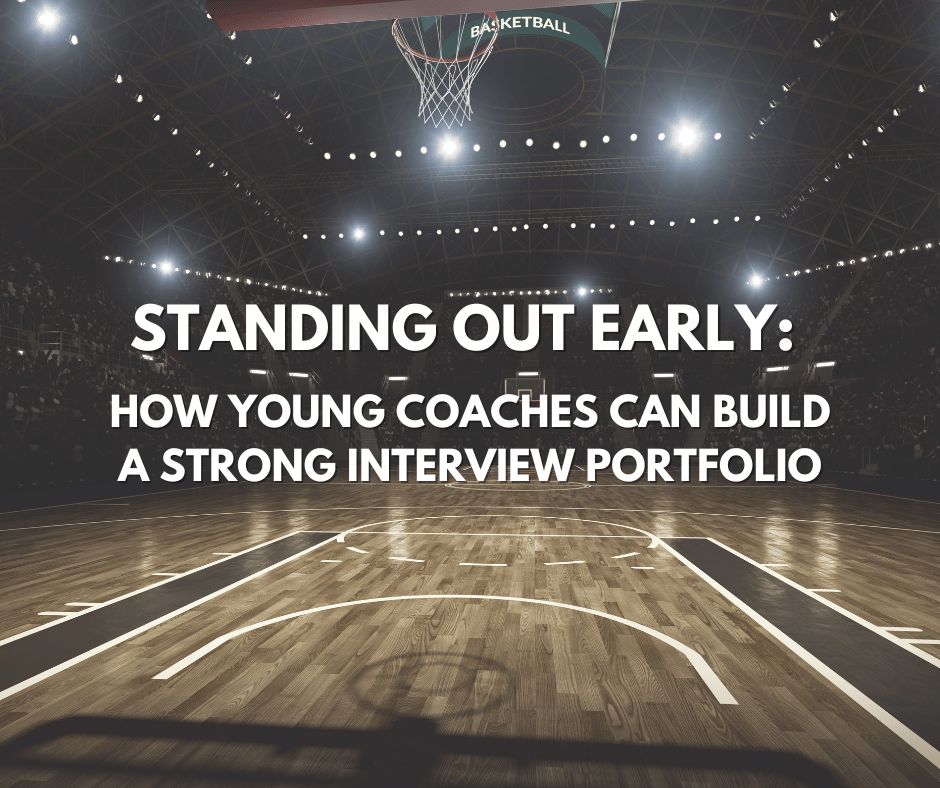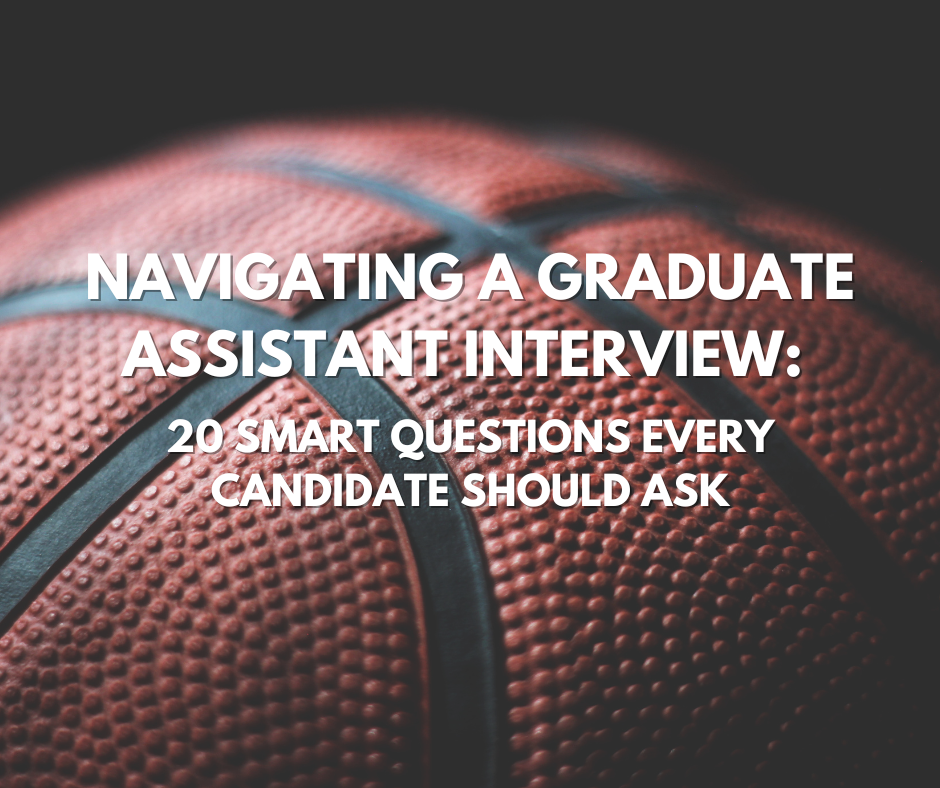You Got the Interview….Now What?
Have you ever been in a coaching interview and absolutely bombed on answering questions you knew you should have nailed?
- Maybe you talked too much?
- Maybe you didn’t talk enough?
- Maybe you didn’t fully understand the question and you rattled off a response that was completely irrelevant to the question?
Being able to tell your story during a coaching interview requires three key points: Problems. Solutions. Results.
- State what the problems were in your former position
- Focus on what you specifically did to provide or implement solutions
- Finally, discuss your results and provide concrete evidence
No matter how tough the questions might be, an AD or head coach is looking to determine your value in relation to their needs. Therefore, it is important that your answers demonstrate how you brought value to your previous programs or institutions. Using the three key points above will help you keep your answers brief and to the point.
For help with your resume and portfolio, sign up for The Coaching Portfolio website at www.coachingportfolio.com.
Tips to Nail Your Next Coaching Job Interview
You finally landed that coveted job interview for your next coaching position. The hard part is over, but now another major challenge is on the horizon: the actual interview.
Here’s how to go into it confident, prepared, and hireable:
Before the Interview: Analyze the job description
When interviewing for a coaching job, you need to make sure you know what’s at the core of the position you are interviewing for. What skills and characteristics are the hiring committee looking for? How can you demonstrate those things during the interview? Study the job description carefully for key words that clue you in to what the hiring committee will be looking for.
Research the school, program, or organization
It sounds basic, but you’d probably be surprised at the staggering number of potential coaches who walk into an interview without researching the potential employer’s background or even visiting its website. Showing up with virtually no knowledge of the school, program, or organization is an excellent way to get your name crossed off the list. One of the main things you need to do if you want to nail your interview is to do as much homework as you can on the school/program you’re interviewing with, including the people you are interviewing with, notable events in the program’s history, big rivals or conference opponents, and key characteristics of the surrounding community. Pick out some of the most interesting points from your background research and have them ready for the interview. The interviewing committee may not ask you something specific about an event two years ago, but think of how impressed they will be if you just so happen to know an interesting fact about that event. This will show the employer that you’re already invested in their school/program before you’ve even accepted the job.
Another important aspect of your background research: if you are interviewing in a community unfamiliar to you, get there the day before so that you can learn more about the area.
Demonstrate how much you want the job
Some people want a job just to have a job – and that’s perfectly respectable in today’s economy – but if you’re not in it to win it, it’ll show in the interview. Don’t bother if you’re going just because you want any job. Demonstrate your passion for the position and why you are the best candidate for the job.
During the Interview: Be ready to engage in conversation
You’re not going into the interview just to answers questions. You should plan to ask questions too – to feel out the position a little more, get a better understanding of what’s required, and get answers to anything else about the position.
Rehearse Your Responses
Don’t memorize your answers to potential interview questions or you will come off as stale and unprepared. Instead rehearse your thoughts, ideas, and philosophies regarding the most common questions asked in a coaching interview. If you are completely confident in your coaching philosophies, there aren’t many questions that will stump you. Have a friend ask you some of the most common questions to help you prepare.
Dress Professionally
Sure, you’re interviewing for a coaching position where khakis and a polo shirt may be your normal everyday attire. This still does not give you the liberty to dress casually during the interview. Keep it as professional as possible with your best suit, dress pants/blazer, or business dress.
Don’t Make The Interviewer Want To Tune You Out
Are you ever listening to someone speak about a topic you’re only semi-familiar with, and they seem to go on and on and on? You find yourself staring at this person thinking, “Are they ever going to stop talking?” If you’re drowning the interviewer in words – especially if the words aren’t relevant to the job, stop right there, because you could be doing more damage than good. Remember that the hiring committee wants to hear why you are a good fit for this position. Give them what they want and nothing more. You can do this by talking about recent employment and why it makes you qualified for the position you are interviewing for. Use your words to sell the interviewer on why you’re a good match – don’t waste time talking about things like your personal history which may be irrelevant in this scenario. If you feel like you’re rambling, reign it in.
Stick to the point. Talk about what is relevant to the interview and the position — your work experience, job qualifications, and your goals for the organization if you are hired. If you are asked questions about personal matters, of course answer, but do so honestly and briefly. Too much unrelated information can ruin an interview and your chances at the position.
Believe in yourself
What sets you apart from other candidates? Your skill set, for one – but also your confidence. Go in with your head high, ready to nail it. Come in knowing you have value to bring to the school/program and show that confidence through the belief in your coaching philosophies and your past experiences and achievements.
Ask good questions
Jot down a list of questions before your interview. Keep questions brief and intelligent. Ask questions about what the goals and expectations are for this position and the school/program, and how success will be measured. Not only does it provide you with information you may need to determine if this will be a good fit for you, but it also shows you are ambitious and motivated to succeed.
After the Interview: Send a thank you note
Sending thank-you notes is a lost art these days, but they’re perhaps never more important than when sent as a follow-up to an interview. Email is okay, but a hand-written note sent via snail mail is better. Personalize the note and reference a memorable part of the interview for an extra edge.
Preparing for sport-specific questions in a coaching job interview
When you sign up for the Coaching Portfolio Guide, you receive a free copy of The Complete Guide to the Coaching Interview. This interview guide includes the most common interview questions asked in a coaching interview with some sample answers. But how does someone prepare for those tricky sport-specific questions during a job interview?
Quite frankly, it would be impossible to provide sport-specific questions for multiple sports with sample answers for those questions for each sport. In our webinars, which are archived on the Coaching Portfolio site, we discuss how your preparation in putting together your materials for the job search process is what most prepares you for answering sport-specific interview questions. If you have carefully thought out your philosophies and put them on paper, you will be confident in answering sport-specific interview questions.
There is no “correct” way to answer sport-specific questions in an interview, especially if there are multiple people sitting in on the interview. You’re going to have 4 kinds of people sitting in on the in the interview, 3 of which are bad:
1-Someone who has no clue about your sport
2-Someone who thinks they have a clue about your sport, but in reality, really doesn’t have a clue
3-Someone who actually does have a clue about your sport and disagrees with your philosophy
4-Someone who actually does have a clue about your sport and agrees with your philosophy
Don’t worry about the “correct” answer, instead, be prepared and confident in your answers to sport-specific answers by frequently evaluating your coaching ideas and philosophies and putting them into practice.
For help with your resume and portfolio, sign up for The Coaching Portfolio website at www.coachingportfolio.com.
Didn’t Get The Interview or Job Offer? Here’s Why!
There are several reasons why you may not get an interview for a position you applied for, or why you didn’t get the offer after interviewing. Understanding what some of these reasons may be will help you prepare and limit any objections you may face during the process.
Reasons Why You May Not Get an Interview
- The organization had somebody already in mind.
- Lack of experience for the position.
- Your experience does not meet the criteria of the position requirements.
- Resume does not stand out or does not properly demonstrate your abilities.
- You didn’t demonstrate interest in the position, or you did not follow up with the head of the search.
- Lack of supporting info/portfolio.
- Lack of references in your application material or poor reference check.
- Higher than normal competition for the position.
- Demographics – age, gender, ethnicity.
- Overqualified.
- Timing (materials received late).
Reasons Why You May Not Get the Job Offer
- Not as qualified as other candidates that interviewed.
- Poor communication/interpersonal/interviewing skills.
- Said something that raised a red flag.
- Did not outline a comprehensive vision for all aspects of the position/program.
- Lack of supporting info/portfolio.
- Showed lack of overall interest.
- Did not show that this was the #1 destination/position.
- Poor reference checks.
- Did not do well with player interviews.
- Did not have a plan for the specific needs of the position/program (lack of research).
- Another candidate was pegged as the leader to fill the position heading into the interviews.
- Salary requirements could not be agreed upon.
- First impressions (dress, timeliness, etiquette).
Need Additional Help?
If you’ve been overlooked for jobs that you’ve interviewed for in the past, there’s no shame in asking for help. That’s why we created The Complete Guide to the Coaching Interview. This guide contains tips and advice to help you nail your next coaching interview. It also contains over 200 sample interview questions that you are likely to be asked during a coaching interview. Even better, we provide guidance on how to answer the toughest interview questions! Receive a FREE copy of The Complete Guide to the Coaching Interview, which includes over 250 sample interview questions specific to coaching jobs + the best answers to common interview questions, when you sign up for The Coaching Portfolio website at www.coachingportfolio.com.






